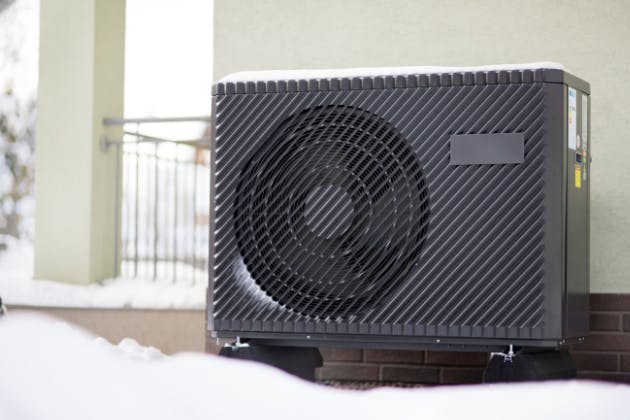Before making the switch to heat pumps, it's important to determine whether a heat pump is suitable for your property. This blog post will guide you through the key factors to consider when assessing your home's compatibility with a heat pump system.
So, can I install a heat pump in my home?

Property Size and Heating Demand
The size of your property and its heating requirements play a crucial role in determining heat pump suitability. Consider the following:
- Floor area: Larger homes typically require more powerful heat pumps.
- Occupancy: More occupants generally mean higher heating demands.
- Personal preferences: If you prefer warmer indoor temperatures, this will increase the heating load.
A professional heat loss calculation is essential for accurate sizing of your heat pump system
Insulation
Proper insulation is paramount for heat pump efficiency. Well-insulated homes retain heat more effectively, reducing the workload on the heat pump. Key areas to focus on include:
- Wall insulation (cavity or solid wall)
- Loft or roof insulation
- Double or triple glazing
- Draught-proofing around doors and windows
If your home lacks adequate insulation, you may need to upgrade before installing a heat pump to ensure optimal performance.
Climate and Outdoor Space
Local climate conditions significantly impact heat pump performance. While modern heat pumps can operate efficiently in temperatures as low as -15°C, their coefficient of performance (COP) decreases as outdoor temperatures drop. In regions with extremely cold winters, larger or more powerful heat pumps may be necessary to maintain comfort levels.
Sufficient outdoor space is required for the heat pump unit. Most manufacturers recommend a minimum clearance of 1 metre around the unit for proper airflow and maintenance access. Some models can be wall-mounted to save ground space, but this may impact noise levels and aesthetics.
Age and Type of Property
Contrary to popular belief, heat pumps are not limited to new builds. Older properties can successfully incorporate heat pump systems, though they may require additional considerations:
Insulation upgrades
Older homes often have less effective insulation, which may need improvement to support heat pump efficiency.
Larger heat emitters
Heat pumps operate at lower temperatures than traditional boilers. In older homes with smaller radiators, these may need to be replaced with larger models or supplemented with underfloor heating to ensure adequate heat distribution.
Electrical system upgrades
Some older properties may require electrical system improvements to support the heat pump's power requirements.
Types of Properties Suitable for Heat Pumps
New Builds
Modern homes are typically well-insulated and designed with energy efficiency in mind, making them ideal candidates for heat pump systems. New builds often incorporate features that complement heat pump technology, such as underfloor heating and smart home systems for optimised temperature control.
Older Properties
While older homes can successfully utilise heat pumps, they may require additional preparation:
- Comprehensive energy assessment to identify areas for improvement
- Insulation upgrades in walls, roof, and windows
- Potential radiator replacements or addition of underfloor heating
- Electrical system evaluation and possible upgrades
Despite these potential modifications, many older properties have been successfully retrofitted with heat pump systems, leading to significant energy savings and improved comfort.
Farmhouses
Farmhouses often present ideal conditions for heat pump installations. The generous land surrounding farmhouses provides multiple options for heat pump unit placement, allowing for optimal positioning to maximise efficiency and minimise visual impact. This ample outdoor space also makes farms potentially suitable for ground source heat pumps, which can offer higher efficiency than air source units.
However, there are considerations to keep in mind. Farmhouses may require significant insulation upgrades before heat pump installation. Additionally, the electrical supply may need upgrading to support the heat pump system.
Barn conversions
Barn conversions offer unique opportunities for heat pump integration. As the interior is often completely redesigned, there's an opportunity to incorporate efficient heat distribution systems like underfloor heating. The conversion process allows for the installation of high-performance insulation, creating an ideal environment for heat pump efficiency.
However, barn conversions do present some challenges. The original barn structure may have high ceilings, requiring careful heat distribution planning. Listed barn conversions may face restrictions on external alterations, affecting heat pump unit placement.
Listed buildings
While more challenging, it is possible to install heat pumps in listed buildings. The key to success lies in careful planning and early engagement with conservation officers. Detailed plans showing minimal impact on the building's character can increase the chances of approval.
the process of obtaining approval can be lengthy and may require multiple revisions to plans. Additional costs may be incurred to ensure the system meets conservation requirements. Some compromises on system efficiency may be necessary to preserve the building's historic features.
Ready to discuss your options?
Get in touch with our heating engineers in Norfolk and Norwich by calling us on 07824393403 and we'll be happy to help.

